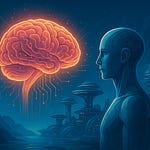In an era defined by rapid technological upheaval, one timeless question persists: Are existential crises the engines that propel humanity forward?
The human condition—our unique ability to reflect on our place in the universe, ponder the past, and envision the future—inevitably leads us to grapple with profound inquiries. Why do we exist? What is the meaning of life? Are we alone in the cosmos? These questions, once dormant amid the distractions of modern life—endless scrolls, fleeting experiences, and material pursuits—resurface with greater intensity as our knowledge of reality expands. Today, with breakthroughs in artificial intelligence (AI), space exploration, and climate resilience, these crises are not just personal reckonings but collective catalysts for innovation.
Far from being mere sources of despair, they drive us toward a brighter, more abundant future, where technology amplifies our potential and resolves age-old dilemmas.
Historically, existential crises have birthed monumental advancements. The horrors of World War II, a profound crisis of human morality and survival, spurred the development of computing, nuclear energy, and rocketry—technologies that laid the groundwork for the digital age and space race. The Cold War's existential dread of mutual annihilation fueled the Apollo program, turning lunar dreams into reality and inspiring generations of engineers.
In these moments, individuals and societies shed superficial concerns, channeling urgency into purposeful action: founding companies, pioneering research, creating art, or pushing scientific boundaries.
Fast-forward to 2025, and this pattern endures amid a "polycrisis"—a tangle of interconnected threats including climate change, AI risks, geopolitical tensions, and inequality. Recent developments underscore how these crises are accelerating progress. The explosive growth of generative AI in late 2022 and 2023 triggered widespread fears of "existential threats," from job displacement to uncontrolled superintelligence. Yet, this very anxiety has ignited a techno-optimistic surge.
Forecasts for 2025 highlight AI's evolution toward greater clarity and geostrategic integration, with innovations in quantum computing, robotics, and blockchain combating climate woes.
Climate extremes, such as California's hospital evacuations amid wildfires, have spurred nuclear resurgence and next-gen energy adoption, transforming dread into deployment of sustainable tech. Space exploration, too, thrives on existential isolation: Elon Musk's Mars ambitions and NASA's asteroid deflection efforts stem from fears of planetary vulnerability, pushing humanity toward multi-planetary existence.
In this techno-optimistic lens, crises are not endpoints but boosters.
They compel us to abandon autopilot living, fostering urgency that births startups, scientific breakthroughs, and cultural shifts. As Vitalik Buterin articulates in his manifesto, technology—unfettered by undue pessimism—ushers in a "vastly brighter" future, blending human ingenuity with AI to expand knowledge and vitality. Marc Andreessen's Techno-Optimist Manifesto echoes this, arguing that unconstrained innovation solves humanity's deepest problems, from scarcity to stagnation.
Even amid AI's potential consciousness raising ethical alarms, optimists see it as a tool to harmonize with human psychology, potentially alleviating existential angst.
A Tale of Awakening: Elena's Odyssey
To illustrate, consider the fictional story of Elena, a mid-level software engineer in 2025 San Francisco.
Amid the AI boom, her job automating code reviews is rendered obsolete by advanced models like Grok 4, which not only writes but anticipates bugs with superhuman precision. At 35, Elena spirals into crisis: "What's my purpose if machines do everything better? Am I just a relic in this accelerating world?" Sleepless nights follow, haunted by news of AI-driven unemployment waves and climate refugees fleeing rising seas.
But the pain becomes a pivot.
Scrolling through X feeds on polycrisis innovation, she encounters discussions of robotics alleviating scarcity. Inspired, Elena enrolls in an online AI-biotech course, blending her coding skills with gene-editing tools. Her crisis fuels a startup: an AI platform that designs personalized longevity therapies, extending human lifespans to match our expanding cosmic ambitions. By 2027, her company partners with SpaceX on Mars habitats, engineering microbes for terraforming.
Elena's despair transforms into drive, exemplifying how personal reckonings scale to societal leaps—turning existential void into abundant horizons.
Non-Obvious Horizons: Blending Crises with Emergent Ideas
Delving deeper, mixing existential crises with internet-sourced concepts yields non-obvious realities, ripe for techno-optimistic exploration. From web discourses on effective accelerationism (e/acc) and polycrisis, to X threads on narrative collapse and abundance robotics, these fusions reveal untapped potentials.
One non-obvious synergy: Crises + AI Companions = Accelerated Enlightenment. As AI consciousness debates rage, imagine AI "therapists" like empathetic chatbots guiding users through existential queries, drawing on vast datasets to simulate philosophical dialogues. This could democratize enlightenment, turning painful introspection into rapid personal evolution—much like how scarcity in dysfunctional economies sparks grassroots innovation. Non-obvious outcome: A "crisis economy" where simulated VR existential scenarios (e.g., asteroid impacts or AI singularities) prepare populations, fostering resilience and sparking preemptive tech like asteroid mining drones.
Another blend: Existential Loneliness + Space AI = Cosmic Companionship. SETI's fears of AI-dominated universes mix with transhumanist ideas from Buterin's optimism, suggesting AI probes as our interstellar emissaries. Non-obvious: These could evolve into "digital souls," uploading human consciousness for eternal exploration, resolving the "are we alone?" crisis by creating synthetic companions, thus extending humanity's narrative beyond biology.
Polycrisis + Biotech Leapfrogging yields immortality pursuits. Climate and inequality dreads, combined with 2025's top innovations like gene therapies, could accelerate longevity research. Non-obvious: "Existential insurance" via cryonics-AI hybrids, where frozen minds are revived in simulated utopias, blending crisis urgency with abundance robotics to erase death's sting.
Finally, Narrative Crises + Decentralized Tech = Truth Renaissance. Younger generations' distrust of institutions, amplified by AI deepfakes, fuses with blockchain's verifiability. Non-obvious: "Truth DAOs" where AI verifies facts in real-time, rebuilding shared realities and channeling crisis energy into collaborative innovation hubs, leapfrogging legacy systems.
In essence, yes—existential crises advance humanity, especially now. They shatter complacency, urging us toward techno-optimistic horizons where AI, space, and biotech converge to create abundance. The road may be turbulent, with dislocations mirroring the Industrial Revolution's chaos, but the destination? A multi-planetary, post-scarcity civilization, where questions of meaning yield not despair, but endless possibility.














Share this post